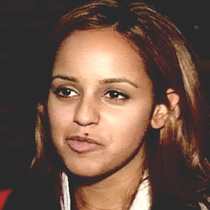-
(单词翻译:双击或拖选)
New York
04 April 2007
New York City is home to the famous Lee Strasberg Theater and film institute, which is known for training actors in what it calls ‘method acting1.’ Urdu TV' s Ravi Khanna went inside the institute to find out more from its instructors2 and students.
Located in downtown Manhattan, the world famous school looks very ordinary from the outside. But ordinary, it is not. Marlon Brando, Paul Newman, Al Pacino, Robert De Niro, Dustin Hoffman, Marilyn Monroe, Uma Thurman, Sissy Spacek and hundreds of other actors we see in American movies have been associated with the institute.
Geoffrey Horne teaches acting there. He first met Strasberg in 1954 and has been associated with the institute from the very day it was established in 1969. He describes Strasberg, who died in 1982, as an American genius. Horne says he teaches his students to work on their characters in a play or a movie from the inside out – meaning first they should enter the character, find out where he is coming from, imbibe3 his feelings and then pay attention to what he wears or his mannerism4.
"What comes first in our life?” Horne asks. “I am hungry, so I want to eat. So what comes first is that I am hungry. I am not going to eat first, I am hungry first. If I am upset because I am lonely, I go out and seek company. So I am home alone, I am lonely, I have no one to talk to and there is nothing on television. I have already eaten, I have already had a drink. I am lonely. I need contact with people. That comes from the inside. I go out and I search for friendship or companionship."
The teaching at the institute is famous for an acting technique that is known as ‘method acting.’ What is it?
"Teaching of the method is to help the actor be alive on the stage – not pretend to be alive, but be alive,” Horne says. “Of course he is alive, because he is a person. So much of the acting we see in the world – on stage, on film, on TV – is phony, it is fake5. You do not really believe anything is happening. We go to the theater to have an experience; we go the movies to have an experience. So the method is to help the actor to have an experience, so that we in the audience can have the experience, a real experience."
 |
| Acting student Clara Govindan |
"We have a lot of acting classes. We start with relaxation,” she says. “We do sensory7 work, then we go into the scene work. The sensory work is where we work on focusing on that aspect of method acting. That is what method acting is."
But it was another student, Virginia Myers, who could really explain what the method is.
"Method acting consists of taking senses and feelings created by situations in your real life and then using them through imagination to recreate what the sensations8 were, and what the feelings were,” she says. “For instance, I can hold this bottle of water in my hand. Now I know how it feels like and I know how much weight it takes to hold the bottle. And then I can put it down and I can imagine holding the same bottle in my hand. I know what it feels like and how much strength it would take to hold the bottle, but it is not really there. So if you can do something like that with your emotions and you can remember what it felt like to have your heart broken or something like that, then you can take those emotions and put them into a play."
She says she is working to act on stage and in the movies and hopes that one day we will see her on the movie screen.
 收听单词发音
收听单词发音
1
acting

|
|
| n.演戏,行为,假装;adj.代理的,临时的,演出用的 | |
参考例句: |
|
|
|
2
instructors

|
|
| 指导者,教师( instructor的名词复数 ) | |
参考例句: |
|
|
|
3
imbibe

|
|
| v.喝,饮;吸入,吸收 | |
参考例句: |
|
|
|
4
mannerism

|
|
| n.特殊习惯,怪癖 | |
参考例句: |
|
|
|
5
fake

|
|
| vt.伪造,造假,假装;n.假货,赝品 | |
参考例句: |
|
|
|
6
spoke

|
|
| n.(车轮的)辐条;轮辐;破坏某人的计划;阻挠某人的行动 v.讲,谈(speak的过去式);说;演说;从某种观点来说 | |
参考例句: |
|
|
|
7
sensory

|
|
| adj.知觉的,感觉的,知觉器官的 | |
参考例句: |
|
|
|
8
sensations

|
|
| 感觉( sensation的名词复数 ); 感受; 知觉; 激动 | |
参考例句: |
|
|
|















